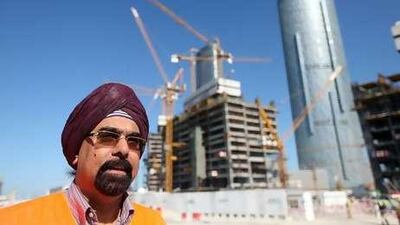The remit of a property developer in the UAE was once fairly simple: build a handful of villas, add a few towers and perhaps an island or two, while a shopping mall would follow to complete the township. Such a plan was successful for many developers in the boom era simply because the market was so buoyant property would sell for a sizeable profit, and quickly.
But since the onset of the financial downturn, developers have been forced to change their strategies drastically. Cash is no longer in ready supply so they have had to come up with new ways of generating income. Building up portfolios of rental property or looking for new sources of cash overseas have been two of the most common methods of maintaining revenues so far. But developers should also consider becoming involved in large-scale projects where they can earn a fee for managing the delivery of all, or part of, the project on behalf of another developer, says Gurjit Singh, the chief operating officer of the Abu Dhabi company Sorouh Real Estate.
Such a model is still in its infancy in the region, Mr Singh says, but it is one that experienced developers could work towards. Possibly the only example of a major developer pursuing this route so far is Emaar Properties. Last year, the Burj Khalifa developer was hired to manage the development of Kingdom City, a township planned in Jeddah, Saudi Arabia. At the time, the Emaar chairman Mohamed Alabbar said: "The agreement only stipulates providing Emaar resources for the management of the development process relating to the project, and there is no requirement for Emaar to invest in this project."
Mr Singh says that by doing this, "a developer can bring in its expertise to push a project forward, while earning a fee ? this happens in more mature markets. "The main developer may need some phases of a large project done by somebody else, so instead of getting a management company in they get an experienced developer." Emaar's profits have been further boosted by its expansion into the retail and hospitality sectors, with Deutsche Bank recently lauding the company for its well-diversified asset base.
"Hotels, malls and rental portfolios are already a decisive part of its real estate assets," the bank said. "It is the most mature real estate player in that sense." Buying land and building homes in countries where there is strong demand from the locals has also proved to be a good source of revenue for some developers. Companies such as Emaar and ETA Star Properties, a Pakistan-based firm that has mainly concentrated on Dubai in recent years, were ahead of the game as they built up considerable land banks in India during the UAE's boom.
This land is now ripe for development. "We have several projects in India and there are plans for more," says Abid Junaid, the executive director at ETA Star. "We have land in Bangalore ? there has hardly been a recession in India." ETA Star is also building homes in Vietnam and Malaysia. "As for the UAE, the revenue stream is only coming from ongoing projects," says Mr Junaid. "Most are 70 or 80 per cent complete, so people have been making payments towards them. We still have a land holding in the UAE, which we're sitting on and waiting for better times to come."
While other companies have considered alternative ways of making money, some are simply concentrating on completing current projects, after which they will be able to book income from final payments, before expanding into new areas. One such firm is Cayan Developments, which is building the Silverene and Jewels residential towers in Dubai Marina. "With the way things are, we're not expanding any further until we finish these," says Ahmad Kassam, the chief development officer at Cayan.
"We have really studied and reviewed a lot of ways to generate revenues but, at the present time, no decisions have been made. From the end of next year, we'll probably start to think about what we can do next." agiuffrida@thenational.ae

